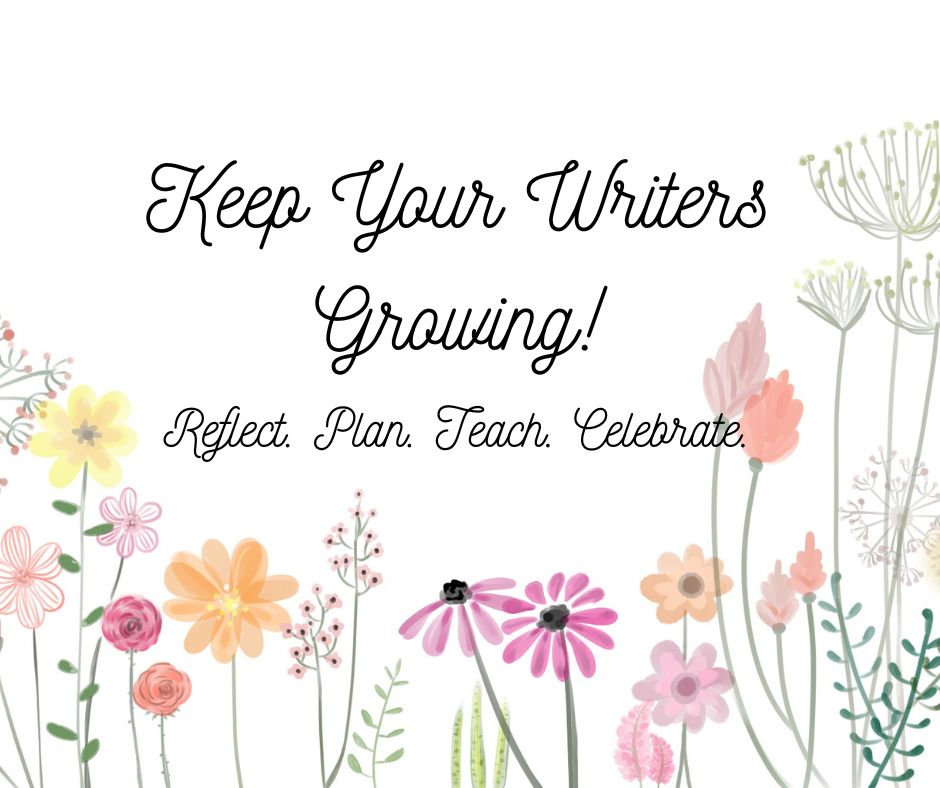| Estimated Reading Time: 4 minutes (777 words) | Target Audience: K-8 Teachers and Coaches |
Even though my heart feels summer coming and my calendar shows that it’s testing season, this is the time of year when I rely on my head to remind me that there is still time left to teach. And not only to teach, but to do some of the most impactful work with students, especially in small groups.
Why This Matters
By this point in the school year, our workshops are well-oiled machines. The routines and structures are in place for kids to work with agency and independence. We know our students–their strengths and needs–deeply, and can plan instruction to precisely target the skills that they will benefit from most as writers. While it’s easy to get caught up in the spirit (and disruptions) of the end of the school year, it’s also the best time to push our students to make a final burst of growth.
How to Keep Groups Going
Step 1: Identify A Few Non-Negotiables
Do you expect all students to end the year with capital letters at the beginning of their sentences? Well-developed paragraphs? Supporting evidence for their claims? Whatever the skill might be, start by clearly naming what you want all of your students to walk out of your classroom able to do by the end of the year.
Try This: Prioritize skills that will fit into any unit of writing you plan to teach at the end of the year. Since this is the time of year to have fun, experiment, and reflect, focus on essential skills you will be able to teach within any genre.
Step 2: Look at Student Writing
Gather up a stack of student writing–or give a quick on demand assessment–and dig in. What are students doing well? Where are some consistent areas of need? One way to frame this work is by simply stating, “I wish my students would ____.” As you flip through students’ writing, look for the patterns that rise to the surface and align them with the non-negotiables you’ve already identified.
Try This: Make sure your observations are balanced by sharing this work with colleagues. It’s important to not just look for the needs of students who have difficulty with writing; instead, make it a point to consider teaching moves you can make for students of all needs and abilities.
Step 3: Plan Some Lessons
Planning small group lessons doesn’t have to be laborious or time-consuming, especially at the end of the year. My favorite way to plan is to clearly identify a skill I want students to learn, name what they can already do, and find a way to model, demonstrate with a mentor text, and/or engage kids in guided practice to raise the level of their work.
Try This: Use samples of work you’ve collected from students all year long–or unfinished pieces in their notebooks and portfolios–to support guided practice, particularly when focusing on revising or editing.
Step 4: Commit to a Goal
The end of the year is fun, exciting, and…overwhelming. There are field trips and talent shows and extra recesses and all of the rituals and traditions that accompany closing out another school year. The truth is that we may go into the last weeks of school with good intentions for teaching but distractions and demands (and exhaustion) derail things quickly. As you launch a final unit of study in writing, try committing to a goal for teaching small groups. Maybe you can commit to teaching one a day; maybe you hope to squeeze in two or three in a week. Whatever you decide, remind yourself of the benefits your students will gain from this time.
Try This: Tackle this work with a colleague. Planning together and keeping each other accountable is the perfect way to keep this work at the forefront of our focus when so many things are vying for our attention.
A Final Step: Celebrate
Don’t forget to honor the work both you and your students have put into growing writing skills, especially in this “home stretch” of the school year. Devoting a little more time to small groups in the final weeks of school will support big gains; make sure you take the time to celebrate the improvements you see with your students.
Go Deeper
Looking for some fun units or writing ideas for the end of the school year? Check out these TWT posts for some end-of-year inspiration!
- In Write to the Finish, Kathleen Neagle Sokolowski shares some last-minute ways to reinforce writing skills in fun and engaging ways.
- Betsy Hubbard highlights 5 writing exercises to try with your writers before they hit the beach this summer in Before You Go.
- If student reflection and feedback on your workshop is what you’re looking for, Melanie Meehan outlines powerful ideas in Asking Students What Worked.


